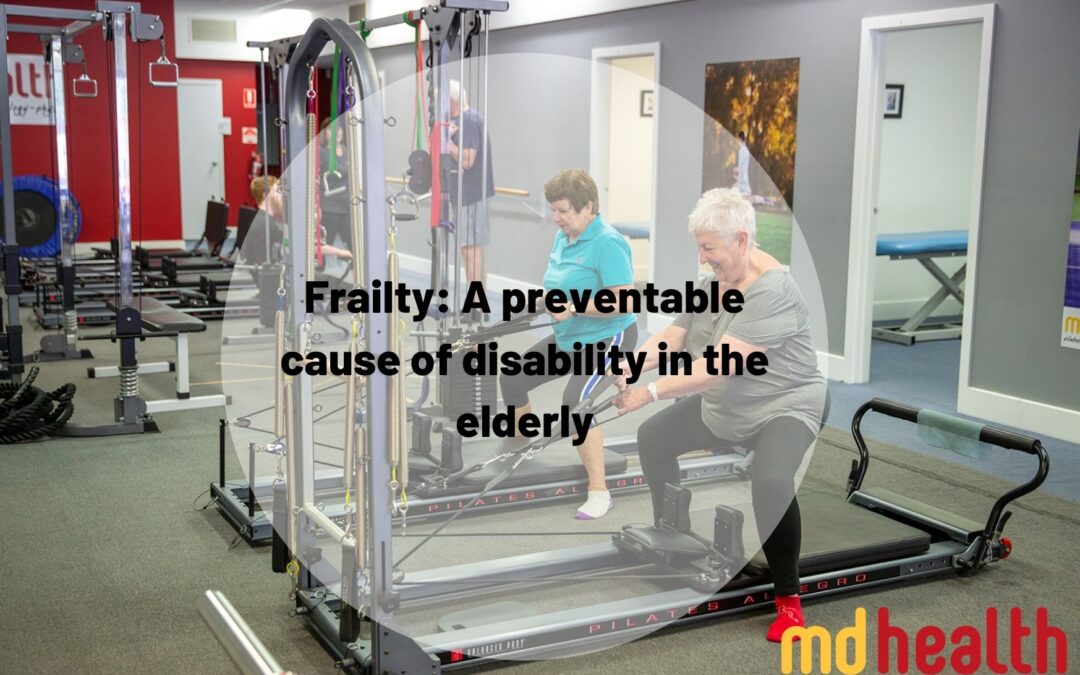Frailty – A preventable cause of disability in the elderly
The recent royal commission into the aged care sector has found very clear findings. Falls due to frailty is the highest cause of preventable death in the aged care sector. This is sad news. Both are a known factor that can be addressed but hasn’t. However, from a positive perspective, this is something that both Physiotherapists and Exercise Physiologists can help with. Both clinicians play and implement a key role in preventing and reversing frailty in the elderly. They help with both a long and higher quality life for the frail and elderly. In fact, implementing a strengthening and balance program, such as the Sunbeam program for 6 months can prevent falls in the elderly by 55%.
At present, there is no direct funding instrument in the aged care sector that helps improve resident’s strength and balance. There is funding for massage, electrotherapy and technical equipment of pain management. None of these improve strength or reduce the risk of falls (APA 2020). The COVID-19 allied health package will provide limited funding to selected aged care facilities. The funding is to run a falls prevention program for a limited amount of time. However, this funding is temporary only. There are no long term plans to continue such programs into the future, despite the clear and obvious benefits.
What is frailty?
Frailty is directly characterized as being weak and delicate and not being able to cope with adverse health events. In particular, it makes you susceptible to illness, hospitalization, disability and mortality. One big aspect, is sarcopenia. This is a loss of muscle mass as you get older (especially after 65). However, and most importantly, frailty is NOT an inevitable result of getting older and can be reversed! (Gill et al 2006).
The key to the management of frailty is early identification (British Geriatrics Society 2017). The following 5 factors are the major indicators:
- Falls
- Reduced mobility
- Delirium
- Incontinence
- Susceptibility to medication side-effects
As a physiotherapist or exercise physiologist, we can use simple, standard functional tests to test for falls and mobility risks, such as:
- Gait speed – Measure of Mobility
- Four metre walk test – Measure of mobility
- 10 minute walk test – Measure of mobility and endurance
- Timed up and go – Measure of both mobility and falls risk
- Grip strength – Proxy test for overall strength, however, specific testing for strength can be added for the individual
- Balance assessment – Test for balance and falls risk
Management of the other 3 factors (delirium, continence and medication side-effects) need to be discussed and managed with your GP or specialists.
What can be done about frailty?
The first and most important start, is a structured and specific exercise and strengthening plan. It needs to focus on improving strength, muscle function, functional ability and cardio fitness. Physical activity and a structured exercise program are BOTH safe AND effective in managing and preventing frailty.
A great program should incorporate the following (Theou et al 2011):
- A combination of weight and resistance training – for building muscle mass and improving bone density
- Balance exercises
- Exercise programs should be conducted 2-3 times a week. They should be difficult enough to be challenging, to encourage adaptation and growth, but be safe enough to minimize the risk of injury. This is where the professional knowledge of a physiotherapist or exercise physiologist is of great value. These guidelines are also consistent with American College of Sports Medicine’s recommendation for exercise for Older Adults (2009).
Other management strategies that should be implemented with the help of other professional disciplines include:
- Home environment modification – With the assistance of an occupational therapist
- Lifestyle changes and protein supplementation – With the assistance of a clinical nutritionist or dietitian
- Medication Review – With the assistance of the GP or specialist
Jovetic, M (2021) As Aged Care reform Quest Continues, Data Back Physiotherapy in Falls Prevention. Physiotherapy In Motion. P 37-42
Do you have any questions?
- Call us on (03) 9857 0644 or (07) 3505 1494 (Paddington)
- Email us at admin@mdhealth.com.au
- Check out our other blog posts here
Our clinical staff would be happy to have chat if you have any questions.



